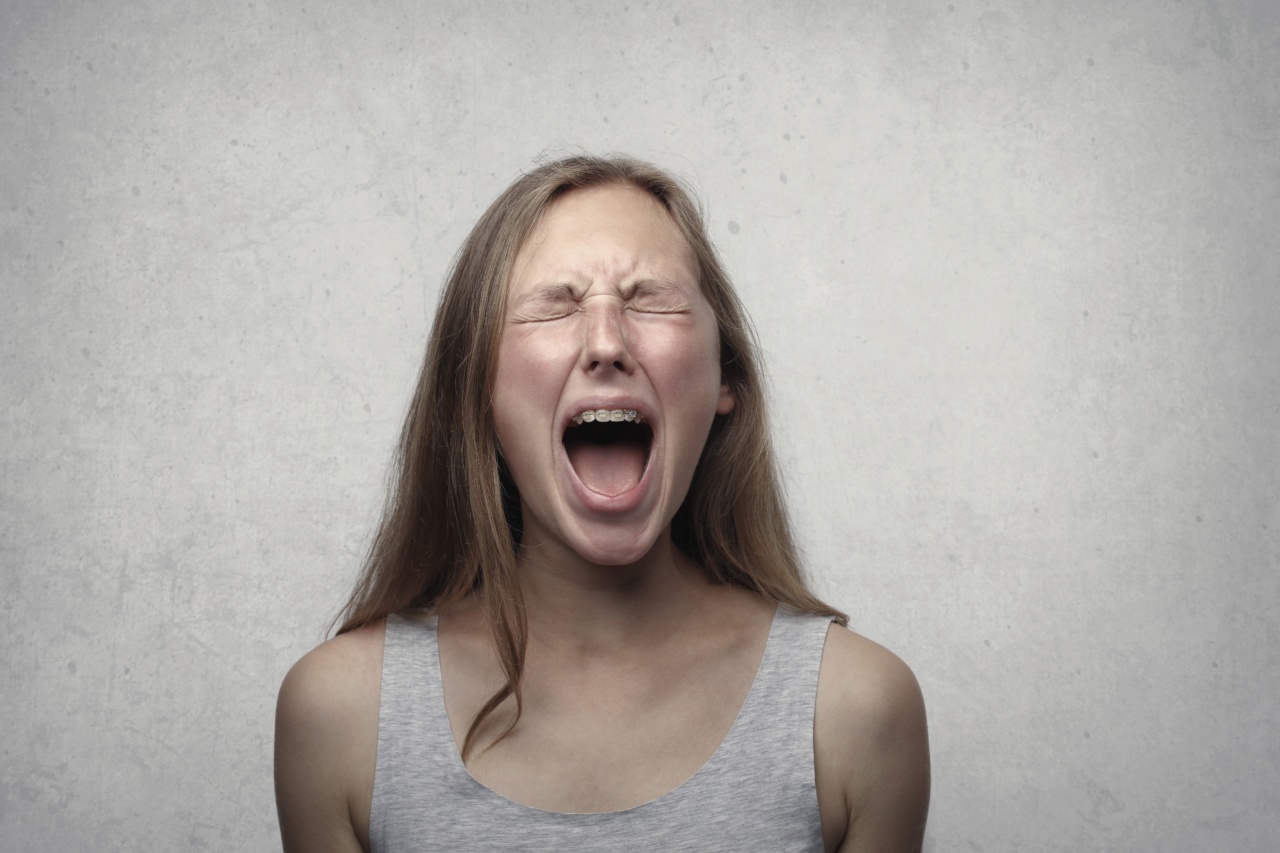Feeling dizzy is a common sensation that many individuals experience at some point in their lives. It is characterized by a spinning or whirling sensation, lightheadedness, unsteadiness, or a feeling of faintness.
Dizziness can range from mild and temporary to severe and chronic, impacting a person’s daily life. In this article, we will explore the causes of dizziness and discuss various solutions and treatments to help alleviate this uncomfortable symptom.
Symptoms of Dizziness
Dizziness can manifest through various symptoms. Some common symptoms include:.
- Vertigo: A spinning or rotating sensation.
- Lightheadedness: Feeling faint or as if you might pass out.
- Unsteadiness: Feeling off-balance or unable to maintain proper coordination.
- Loss of balance: Difficulty keeping upright posture.
- Feeling disoriented: Confusion or difficulty in understanding surroundings.
- Nausea: Feeling queasy or experiencing an urge to vomit.
These symptoms may occur individually or in combination, depending on the underlying cause of dizziness.
Common Causes of Dizziness
Dizziness can arise from various factors, and identifying the specific cause is crucial in determining the right treatment approach. Here are some of the common causes of dizziness:.
1. Inner Ear Disorders
The inner ear plays a crucial role in maintaining balance and spatial orientation. Any disruption in the inner ear can lead to dizziness. Common inner ear disorders causing dizziness include:.
- BPPV (Benign Paroxysmal Positional Vertigo): Loose calcium crystals in the inner ear cause brief episodes of severe spinning sensation triggered by changes in head position.
- Labyrinthitis: Inner ear inflammation usually resulting from viral infections.
- Ménière’s Disease: A chronic inner ear disorder characterized by recurring episodes of vertigo, hearing loss, tinnitus (ringing in the ears), and a feeling of fullness in the affected ear.
2. Medications
Sometimes, certain medications can have side effects that include dizziness. Blood pressure medications, anticonvulsants, sedatives, tranquilizers, and certain antidepressants are known to cause dizziness as a side effect.
If you suspect that your medication is causing dizziness, consult your healthcare provider for alternative options or adjustments to the dosage.
3. Low Blood Pressure
When your blood pressure drops suddenly or becomes too low, it can result in dizziness. This can occur due to dehydration, heart problems, endocrine disorders, prolonged bed rest, or certain medications.
Ensuring adequate hydration, avoiding sudden changes in position, and regular exercise can help manage low blood pressure and reduce the likelihood of dizziness.
4. Vertigo
Vertigo is a specific type of dizziness characterized by a spinning sensation. It is often caused by an inner ear problem, such as a vestibular migraine, inflammation, or the displacement of calcium crystals within the inner ear.
Diagnosis and treatment for vertigo can involve medication, physical therapy, or specific exercises designed to alleviate symptoms.
5. Anxiety and Panic Disorders
Severe anxiety and panic disorders can induce dizziness as a symptom. The body’s response to stress can trigger hyperventilation, leading to a decrease in carbon dioxide levels and subsequent dizziness.
Managing and treating anxiety through therapy, relaxation techniques, and medication can help reduce dizziness caused by these conditions.
6. Anemia
Anemia, particularly iron-deficiency anemia, can result in dizziness due to a reduced oxygen-carrying capacity in the blood. This can cause inadequate oxygen supply to the brain, resulting in dizziness and fatigue.
Treating the underlying cause of anemia and incorporating iron-rich foods or supplements can help alleviate dizziness in such cases.
7. Dehydration
Insufficient fluid intake can lead to dehydration, which in turn can cause dizziness. This is especially common during hot weather or intense physical activity when the body loses fluids through sweating.
Proper hydration by drinking enough water and consuming hydrating foods can prevent dehydration-related dizziness.
8. Hypoglycemia
A sudden drop in blood sugar levels, known as hypoglycemia, can result in dizziness, shakiness, and weakness. This commonly occurs in individuals with diabetes who take insulin or other blood sugar-lowering medications.
Maintaining stable blood glucose levels through regular meals, balanced diet, and proper medication management can help prevent dizziness caused by hypoglycemia.
9. Cardiovascular Problems
Certain heart conditions, including arrhythmias, aortic stenosis, or heart attack, can cause dizziness, chest pain, and shortness of breath.
If you suspect that your dizziness is related to a heart problem, it is essential to seek immediate medical attention.
10. Other Causes
There are several other potential causes of dizziness, including migraines, head injuries, neurological disorders, hyperventilation syndrome, side effects of certain surgeries, and underlying psychiatric conditions.
Identifying and addressing these specific causes require a comprehensive evaluation by a healthcare professional.
Seeking Medical Advice for Dizziness
While occasional dizziness may be harmless, persistent, recurrent, or severe dizziness should prompt you to seek medical advice.
A healthcare professional, such as a primary care physician, an otolaryngologist (ear, nose, and throat specialist), or a neurologist, can help diagnose the underlying cause of your dizziness and recommend appropriate treatment options.
During a medical consultation for dizziness, the healthcare provider may:.
- Review your medical history and inquire about the specifics of your dizziness symptoms.
- Conduct a physical examination, focusing on the neurological and ear-related aspects.
- Suggest additional diagnostic tests like a hearing test, blood tests, imaging (such as X-ray, CT scan, or MRI), an electrocardiogram (ECG), or specific balance tests.
Treatment and Solutions for Dizziness
The appropriate treatment for dizziness largely depends on the underlying cause. Here are some possible solutions and treatment options:.
1. Medications
Based on the diagnosis, your healthcare provider may prescribe medication to manage your dizziness. Medications can include:.
- Antihistamines: To alleviate symptoms of motion sickness and reduce dizziness.
- Vestibular suppressants: To reduce vertigo and dizziness symptoms associated with inner ear disorders.
- Anti-anxiety medications or antidepressants: To address dizziness caused by anxiety or panic disorders.
- Antiemetics: To relieve nausea and vomiting associated with dizziness.
It is essential to follow your healthcare provider’s instructions and complete the prescribed course of medication.
2. Canalith Repositioning Maneuvers
In cases of BPPV, canalith repositioning maneuvers are often recommended. These series of head movements help reposition the loose calcium crystals within the inner ear, alleviating the vertigo associated with BPPV.
This procedure is best performed under the guidance of a healthcare professional or physical therapist with expertise in vestibular rehabilitation.
3. Physical Therapy
Physical therapy, including vestibular rehabilitation therapy (VRT), can be highly effective in treating dizziness associated with inner ear disorders.
VRT involves specific exercises and techniques aiming to improve balance, reduce dizziness, and enhance overall vestibular function.
4. Lifestyle Modifications
Modifying certain habits and making lifestyle changes can help prevent or reduce dizziness. Some essential modifications include:.
- Staying hydrated by drinking plenty of fluids throughout the day.
- Avoiding sudden changes in position, particularly when getting up from lying or sitting down.
- Managing stress through relaxation techniques, therapy, or meditation.
- Following a healthy diet rich in essential nutrients, especially iron and vitamins.
- Avoiding excessive consumption of alcohol, caffeine, and nicotine.
5. Surgical Interventions
In rare cases where dizziness is caused by structural problems, such as specific inner ear disorders or tumors, surgical interventions may be necessary.
Surgical options can aim to correct abnormalities, remove tumors, or relieve pressure within the affected area. Your healthcare provider will discuss the potential risks and benefits of surgery if it is deemed necessary.
6. Home Remedies for Dizziness
Alongside medical interventions, there are several home remedies and self-care strategies that can help manage dizziness or provide temporary relief. These include:.
- Lying down or sitting still in a quiet, dark room.
- Avoiding sudden movements or bright lights.
- Applying cool compresses to the forehead or back of the neck.
- Practicing deep breathing exercises or relaxation techniques to calm the body and reduce stress.
- Sipping on ginger tea or ginger ale to alleviate nausea associated with dizziness.
While these home remedies may provide temporary relief, it is essential to address the underlying cause of dizziness with the help of a healthcare professional for comprehensive and long-lasting solutions.
Conclusion
Feeling dizzy can be an uncomfortable and disruptive experience. Understanding the causes of dizziness and seeking appropriate management is crucial for improved overall well-being.
It is important to consult a healthcare professional if you experience frequent, severe, or persistent dizziness, as they can provide accurate diagnosis and guide you through the most effective treatment options. By addressing the underlying causes and implementing lifestyle modifications, medications, physical therapy, or home remedies, you can alleviate dizziness and regain control over your daily life.



























